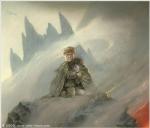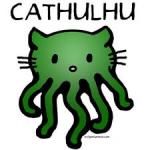Quote
Quote
The fact that a whole slew of websites have already done the work for me means I needn't type it out here and do your googling for you, but it's pretty freely available the easy comparisons. Start with the various ones I mentioned already.
That's a "no", then.
Quote
None of these examples, as singular homages with vaster, greater works, are the more complete and hewing historical cribbing that Martin gets into with his series
Because you say so?
Interesting.
Quote
The Tudors were only vaguely related to the royal line by the second marriage of Catherine of Valois to essentially a nobody from Wales (Owen Tudor) - there were a lot of people had better and closer claims to the throne than the Tudors. It's arguably nitpicky but they really weren't closely related (and that's why they're interesting and precocious, and the eventual outcome is so fascinating)
Oh, that's fair, but the Tudors are certainly more closely related to the other combatants than the Tyrells or Targaryens (depending on which family you consider the equivalent of the Tudors: the Targs because they win, or the Tyrells because of the rose symbol and their superior position at the end of ADWD), whose relationship to the Starks and Lannisters is fairly minor. Also note that the Wars of the Roses was fought for the crown itself, whilst the Starks are fighting initially to free Ned and then for independence, and the Lannisters are fighting to support a Baratheon claimant (albeit related to themselves).
Quote
Agreed on Towton, but if you don't restrict it to just the War of the Five Kings and go back to Robert's Rebellion, I would say there's a good argument Tywin is Warwick. It's not exact but it's there. If memory serves, the Lannisters come into the Aerys/Robert fight very late on Robert's side after Tywin falls out with Aerys (Warwick changed sides and allied to Margaret of Anjou late in the game after becoming disillusioned with Edward IV). Tywin's daughter marries the proposed king after being refused a previous match - Edward IV forbade his brother George of Clarence to marry Isabel Neville, Warwick's daughter - so Warwick had them married when he defected to Margaret. His second daughter Anne then ends up married to Richard III.
I'm not sure on that. Tywin deliberately absents himself from the entire war and plays no role until the last minute, whilst Warwick was involved from very early on and his support was vital to both sides (hence the Kingmaker epithet). They were both extremely rich, but a major difference was that Tywin had his own enormous, mostly loyal army whilst Warwick didn't have such a large force (well, no-one in the actual history did, because England was far tinier than Westeros in size and population).
Tywin's support was also helpful in ending the war so quickly, but following the victory at the Trident, the Stark-Lannister-Tully-Baratheron-Arryn army had overwhelming superiority of numbers and resources, so they would have won regardless. It would have just taken a longer siege of King's Landing.
Quote
The Baratheon brothers are a fairly good parallel for the three brothers of the House of York. The Robert of the first book is late-game Edward IV (fat, whoring etc.) whereas the young Robert of Robert's Rebellion fits too - tall, imposingly built, gifted battle commander etc., Renly is George of Clarence (affable, shallow, opportunistic) and Stannis is Richard of Gloucester (particularly if you're a subscriber to the "Richard murdered the Princes in the Tower" theory) - Richard was deeply pious and also entirely ruthless, but did plenty that was "for the good of the realm/common weal" as well. He also loses his only child (Edward of Middleham).
I'd say there are some similarities and differences there. Edward IV I think was split between Robert (the far whoring bit) and Robb (the dashing young warrior who led from the front and followed his heart when it cost him his support). I think Renly was far more charismatic and convincing than George of Clarence, and there is no evidence that George was gay. Also, Richard (who I agree has some Stannis-like qualities) tried to save his brother rather then directly arranging his death.
Quote
With regards your list of other fantasy examples - I do wonder if they would bother me more if I read them in the form of a world book in one or two sittings. Martin's felt more egregious in that form (because it was all coming thick and fast) than it possibly is. But whichever Aegon it was (if it was an Aegon, might have been a Maegor?) who got fat and temperamental and had six wives still really irks me. That would have taken no effort to alter.
Maegor the Cruel (who wasn't fat but did go stark raving mad and impaled himself to death on the Iron Throne) had six wives, four of them simultaneously, but as a character he was very different to Henry VIII. You might also be thinking of Aegon IV, who did get monstrously fat: he only had one wife (his sister-wife Naerys) but he did have nine "great mistresses" and very many minor ones.
 Tsundoku, on 27 November 2018 - 12:09 PM, said:
Tsundoku, on 27 November 2018 - 12:09 PM, said: Gorefest, on 27 November 2018 - 11:57 AM, said:
Gorefest, on 27 November 2018 - 11:57 AM, said: Whisperzzzzzzz, on 27 November 2018 - 04:46 AM, said:
Whisperzzzzzzz, on 27 November 2018 - 04:46 AM, said:
 Help
Help
 Add Reply
Add Reply



 MultiQuote
MultiQuote


















